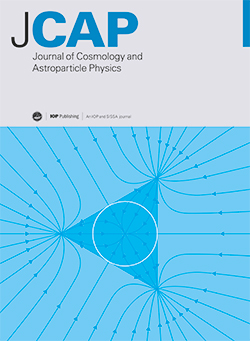Thermal pressure on ultrarelativistic bubbles from a semiclassical formalism
IF 5.3
2区 物理与天体物理
Q1 ASTRONOMY & ASTROPHYSICS
Journal of Cosmology and Astroparticle Physics
Pub Date : 2024-11-19
DOI:10.1088/1475-7516/2024/11/024
引用次数: 0
Abstract
We study a planar bubble wall that is traveling at an ultrarelativistic speed through a thermal plasma. This situation may arise during a first-order electroweak phase transition in the early universe. As particles cross the wall, it is assumed that their mass grows from ma to mb, and they are decelerated causing them to emit massless radiation (mc = 0). We are interested in the momentum transfer to the wall, the thermal pressure felt by the wall, and the resultant terminal velocity of the wall. We employ the semiclassical current radiation (SCR) formalism to perform these calculations. An incident-charged particle is treated as a point-like classical electromagnetic current, and the spectrum of quantum electromagnetic radiation (photons) is derived by calculating appropriate matrix elements. To understand how the spectrum depends on the thickness of the wall, we explore simplified models for the current corresponding to an abrupt and a gradual deceleration. For the model of abrupt deceleration, we find that the SCR formalism can reproduce the Ptherm ∝ γ0w scaling found in earlier work by assuming that the emission is soft, but if the emission is not soft the SCR formalism can be used to obtain Ptherm ∝ γ2w instead. For the model of gradual deceleration, we find that the wall thickness Lw enters to cutoff the otherwise log-flat radiation spectrum above a momentum of ∼ γ2w / Lw, and we discuss the connections with classical electromagnetic bremsstrahlung.从半经典形式主义看超相对论气泡的热压力
我们研究了以超相对论速度穿过热等离子体的平面气泡壁。这种情况可能出现在早期宇宙的一阶电弱相变过程中。当粒子穿过气泡壁时,假定它们的质量从 ma 增长到 mb,并且它们被减速,导致它们发出无质量辐射(mc = 0)。我们感兴趣的是流向墙壁的动量传递、墙壁感受到的热压以及由此产生的墙壁末端速度。我们采用半经典电流辐射(SCR)形式来进行这些计算。带电粒子被视为点状经典电磁电流,量子电磁辐射(光子)的频谱通过计算适当的矩阵元素得出。为了了解频谱如何取决于壁厚,我们探讨了与突然减速和逐渐减速相对应的简化电流模型。对于突然减速模型,我们发现 SCR 形式主义可以通过假设发射是软的来重现早期工作中发现的 Ptherm ∝ γ0w 缩放,但如果发射不是软的,则可以使用 SCR 形式主义得到 Ptherm ∝ γ2w。对于逐渐减速模型,我们发现壁厚 Lw 在动量 ∼ γ2w / Lw 以上时会切断原本对数平坦的辐射谱,我们还讨论了与经典电磁轫致辐射的联系。
本文章由计算机程序翻译,如有差异,请以英文原文为准。
求助全文
约1分钟内获得全文
求助全文
来源期刊

Journal of Cosmology and Astroparticle Physics
地学天文-天文与天体物理
CiteScore
10.20
自引率
23.40%
发文量
632
审稿时长
1 months
期刊介绍:
Journal of Cosmology and Astroparticle Physics (JCAP) encompasses theoretical, observational and experimental areas as well as computation and simulation. The journal covers the latest developments in the theory of all fundamental interactions and their cosmological implications (e.g. M-theory and cosmology, brane cosmology). JCAP''s coverage also includes topics such as formation, dynamics and clustering of galaxies, pre-galactic star formation, x-ray astronomy, radio astronomy, gravitational lensing, active galactic nuclei, intergalactic and interstellar matter.
 求助内容:
求助内容: 应助结果提醒方式:
应助结果提醒方式:


